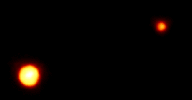|
~
Pluto |
||
-- Pluto------ This planet is only two-thirds the size of Earth's moon. Pluto is the smallest planet in our solar system. Its mass is only 1/500 the mass of the Earth. Pluto's diameter, estimated to be about 1,430 miles (2,300 km), is less than 1/5 the Earth's diameter. Pluto is only two-thirds the size of Earth's moon. Pluto was named after the Roman god of the dead. Besides being the smallest planet, Pluto is also a low-density planet. It is the only planet not considered either a terrestrial planet or a gas giant, making it different from all the other planets in our solar system. Scientists once thought the planet was made of ice and rock. However, in 1992, scientists discovered that Pluto consists of 97 percent nitrogen and small amounts of carbon monoxide and methane. Pluto is usually the farthest planet from the Sun. However, because of its irregular orbit, the planet's orbit is inside Neptune's orbit when it is closest to the Sun. Pluto moves inside Neptune's orbit every 248 Earth years and stays there for about 20 Earth years. Pluto is so far from the Earth that it is one of only two planets that cannot be seen without a telescope. The other planet that cannot be seen without a telescope is Neptune. Even through a large telescope, Pluto only appears to be a yellowish dot of light. No spacecraft has ever visited Pluto. In fact, there weren't even any clear photographs of the planet until the Hubble Space Telescope photographed it in September 1990. Pluto is about 39 times farther from the Sun than our planet. It is the coldest planet. Scientists think the temperature on Pluto is about -387 degrees F (-233 C) and that's only a few degrees above absolute zero. Pluto rotates once completely on its axis about every 6 Earth days. The planet completes one revolution around the Sun every 248 years. Scientists debate whether Pluto is a true planet. Some scientists believe Pluto was once a moon of Neptune that either drifted into its own orbit or was knocked into a separate orbit during a collision. Other scientists believe Pluto is an asteroid. In 1905, astronomer Percival Lowell mathematically predicted the existence of the planet. However, it wasn't discovered until 1930 by American Clyde Tombaugh. In fact, Pluto is the only planet discovered by an American. Unfortunately, Lowell didn't live long enough to see his prediction come true. Pluto was the last planet discovered. Charon is a moon of Pluto. It was discovered in 1978. Charon is over half the size of Pluto, making it the largest moon relative to its planet in our solar system.
|
||

